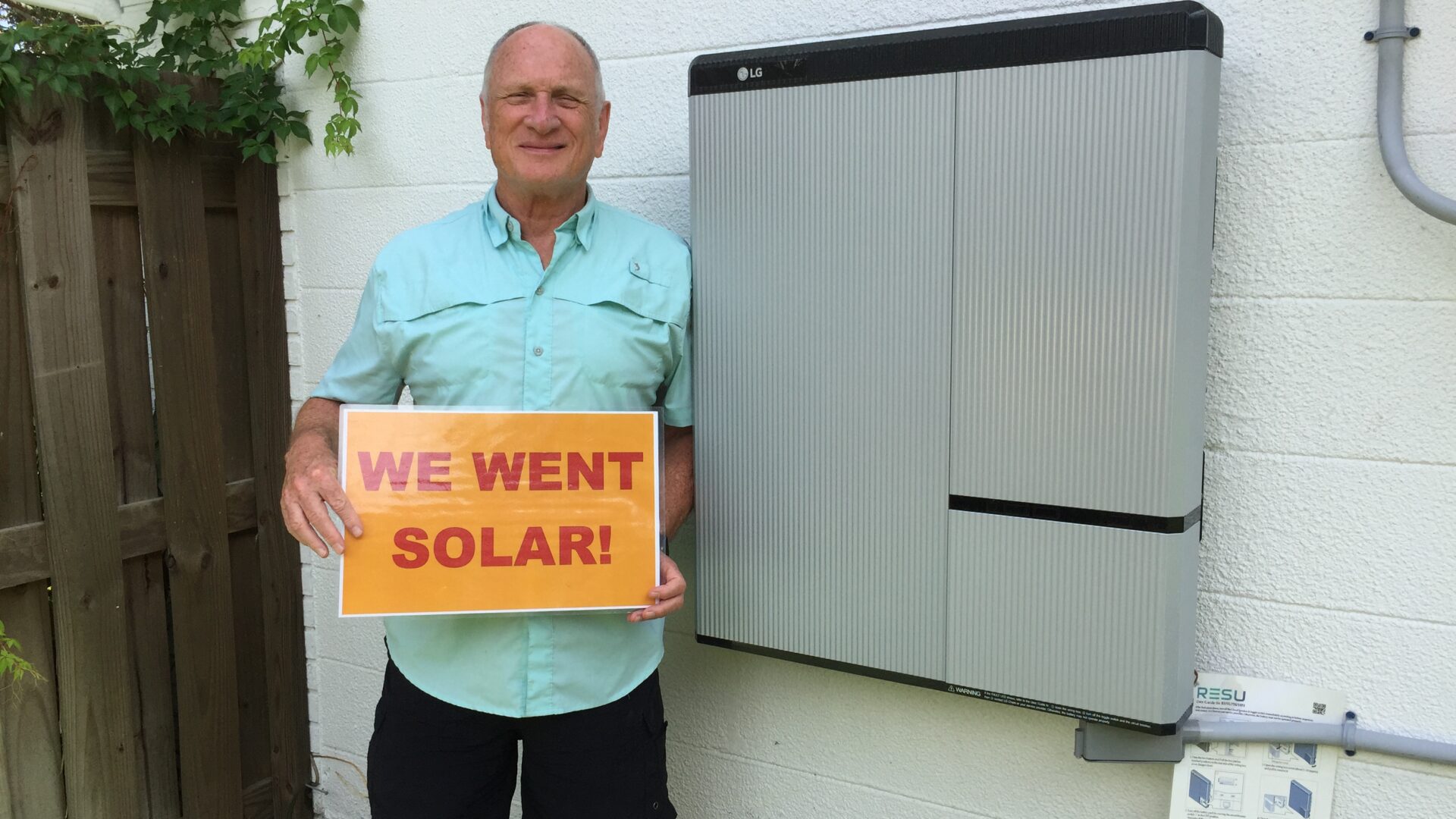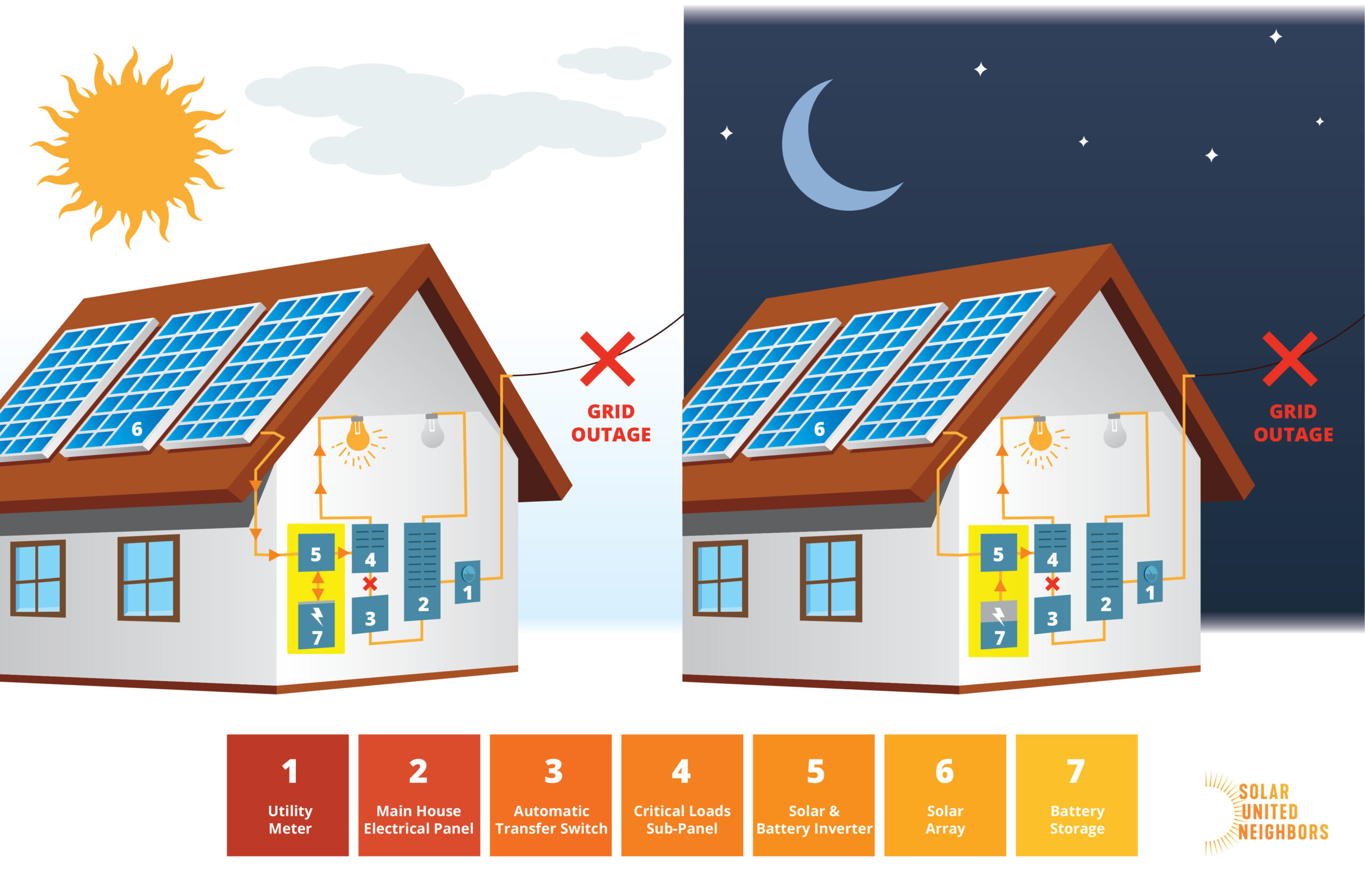Solar and storage: an ideal pair
- Factsheet

What is battery storage?
Batteries allow you to store electricity and use it later. Combined with solar, batteries can charge during the day when the sun is shining. They can power your electric needs when the sun sets. They also ensure you have electricity when the grid goes down.
Battery Storage Guide for Homeowners
Find out how battery backup works, what batteries cost, and whether adding battery storage is right for you.
Why pair solar and battery storage
There are several benefits to pairing solar systems with batteries.
Maintain power when electric service stops
Most rooftop solar systems are connected to the electric grid. This means that when the power goes down your solar system automatically shuts off. It does so as a safety measure. If your system is generating electricity and sending it out along electrical lines, it may harm the repair crews working to restore electric service.
Pairing solar with storage means you can keep the lights on if your utility service goes down.
Battery storage does come at a cost. Adding battery storage to your solar array could increase the price so much that you may not recuperate your initial investment through utility bill savings. However, if you live in an area with poor electric reliability, you may find the trade-off worth it. Battery storage will keep critical loads, like refrigerators and medical equipment, working when utility power goes out.
Manage energy use and save money

Most utilities have started varying the cost of electricity based on the time of day (called “time of use” pricing). They’ve done so to encourage their customers to use less electricity when demand is high. With battery storage, you can spend less on electricity. You can store the solar electricity you’ve generated. Then you can deploy that stored electricity during times when electricity costs are high.
Additionally, batteries can offset demand charges, which are becoming more common in utility rates designed specifically for solar homeowners. Together, these cost mitigation strategies are known as energy arbitrage.
Community resilience
Solar systems with battery backup can provide individuals and communities with much needed resiliency in the face of natural disasters. These systems provide power when the electric grid goes down. This can protect vulnerable communities from a disaster’s most immediate and devastating effects. If fuel is unattainable during a disaster, solar-powered battery systems have a clear advantage over gas-powered generators. Solar-powered systems provide fuel on site.
How the new tax credit makes batteries more affordable
In 2022, Congress passed the Inflation Reduction Act (IRA). This bill provided a 30% tax credit for the purchase of batteries. Battery storage systems with at least 3 kilowatt-hours of capacity qualify for the credit.
In July 2025, Congress voted to repeal tax credits for solar and battery storage. The residential solar tax credit expires at the end of 2025. If buying a system outright or through loan financing, homeowners will no longer be able to qualify for the credit. However, third party ownership models (solar leases and power purchase agreements) qualify under the commercial tax credit. This is still in effect through 2029. In these cases, the system owner would be eligible for the federal tax credit as long as certain requirements are met. Your solar installer will be able to let you know if your system qualifies.
Nonprofits and small businesses use the commercial tax credit. Systems using this tax credit must be installed by the end of 2029 and follow certain rules about Foreign Entities of Concern requirements and when to start construction. IRS Elective Pay for nonprofits is still active. Your solar installer will be able to let you know if your system meets these requirements. Most of these requirements come into effect in 2026. (Note: SUN is not a tax advisor. You should consult a tax advisor to determine the extent to which your installation is eligible.)
If you’re concerned about the repeal of solar tax credits and other pro-solar policies, contact your members of Congress and share your support for solar energy.
After the credit expires, if buying a system outright or through loan financing, homeowners will no longer be able to qualify for the credit. However, third party ownership models (solar leases and power purchase agreements) qualify under the commercial tax credit. This is still in effect through 2029. In these cases, the system owner would be eligible for the federal tax credit as long as certain requirements are met. Your solar installer will be able to let you know if your system qualifies.
Ways SUN is helping homeowners add storage
- We’ve put together a comprehensive guide for homeowners who are interested in battery storage. Download the free guide now.
- We’ve held multiple webinars about solar and battery storage. View the most recent webinar, Solar + Storage, recorded in March 2023.
- We’ve conducted an in-depth analysis of the current “state of the art” of solar and storage. We wanted to see if solar and storage is a viable way to protect vulnerable communities from the impacts of climate change. We used the Hampton Roads, Virginia region as a test case. We modeled the financial feasibility of these projects. We then identified ways to scale up their deployment. Download the full report on solar + storage for resiliency.
- Our Maryland Storage Co-op Pilot in 2017 was our first co-op that focused on adding battery storage to existing solar systems. Today’s solar co-ops offer solar and storage options.
- We’ve compiled state-specific information about solar + storage in D.C., Florida, Maryland, and Virginia. Live elsewhere and have questions? Contact our Solar Help Desk!
More resources on solar and storage
Webinar: Solar + Storage for Homeowners
Solar Plus Storage: A Resiliency and Climate Mitigation Strategy for Vulnerable Communities
Understanding Solar+Storage: Answers to Commonly Asked Questions about Solar PV & Battery Storage
Solar Plus: A holistic approach to distributed solar PV
The economics of grid defection
Reverse Power Flow: How Solar+Batteries Shift Electric Grid Decision Making from Utilities to Consumers
Powering your home during an outage
Get the latest on solar straight to your inbox.
Fight for your solar rights.
Everyone has the right to go solar. Spread the sunshine nationwide and in your local community by taking action, joining events, and more.